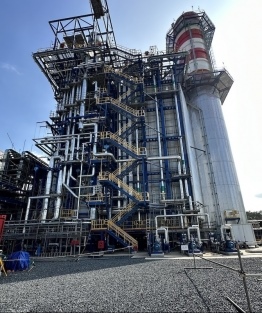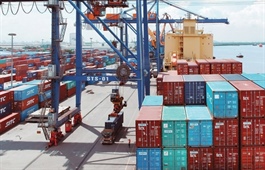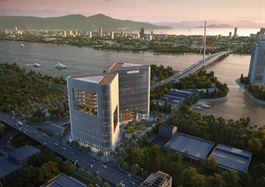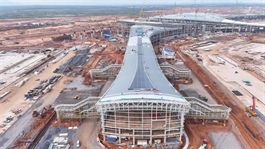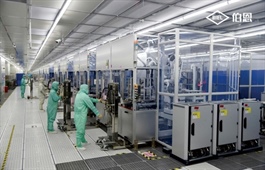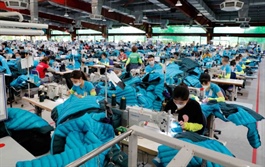Green roadmaps a key strand for eco-IP conversion
Green roadmaps a key strand for eco-IP conversion
Developing specific roadmaps for the green transition is seen as a key solution to promoting the shift towards green and eco-industrial park models across the country.
June 20, the former Ba Ria-Vung Tau People’s Committee issued an action programme for industrial parks (IPs), aiming to convert existing zones into eco-IP models aligned with sustainable development and the net-zero target by 2050. The initiative contributes to the implementation of the national strategy on green growth for the decade, with a vision to 2050.
By 2030, the province aims for three existing parks – Phu My 3, Phu My 2, and Sonadzi Chau Duc – to be certified as eco-IPs. In addition, two new zones currently being planned and developed are to obtain similar certification, while 50 per cent of companies operating in such zones are targeted for certification as eco-enterprises.
Modern technologies will be applied to reduce material use and optimise factory production, while circular economy principles will be integrated into the green shift to cut greenhouse gas emissions and support sustainable growth.
The action plan includes seven groups of tasks and solutions, such as stepping up media campaigns, holding green initiative competitions, and raising worker awareness through engaging and accessible formats.
Alongside Ba Ria-Vung Tau, Ho Chi Minh City in mid-May approved its IP development plan to 2030, with a vision to 2050, and outlined priority sectors for capital mobilisation.
Ho Chi Minh City Export Processing and Industrial Zones Authority (HEPZA) is coordinating with infrastructure providers to pilot the transformation of five zones – Tan Thuan, Hiep Phuoc, Tan Binh, Cat Lai, and Binh Chieu – into high-tech industrial areas and logistics hubs.
HEPZA is developing detailed implementation plans, with a focus on expanding industrial space via regional connectivity and shared benefits, especially following the merger of Binh Duong and Ba Ria-Vung Tau into Ho Chi Minh City to boost collaboration and leverage each locality’s strengths.
Nguyen Quang Thanh, deputy general director of Ho Chi Minh City State Financial Investment Company, said, “The city offers interest rate support for priority sectors with loans of up to $80 million, with a preferential period of seven years. Enterprises in Ho Chi Minh City High-Tech Park, Quang Trung Software Park, and IPs can access this policy.”
Vo Van Hoan, Vice Chairman of Ho Chi Minh City People’s Committee stressed that the 17 existing export processing and IPs must actively formulate proposals for technology upgrades, encouraging businesses to gradually adopt clean, green, and environmentally sustainable technologies.
According to HEPZA, by 2033 the city will expand its network by adding 14 new IPs across over 3,800 hectares, alongside the current 17 areas. The pilot transformation of the five aforementioned parks into high-tech, eco-oriented, and multi-functional industrial spaces will continue as part of this strategy.
Many other localities – including Quang Ninh, Haiphong, Ninh Binh, Vinh Phuc, and Thanh Hoa – are also creating better conditions for investors seeking to develop green, sustainable industrial infrastructure.
In Thanh Hoa province, local authorities have prioritised maximum support for environmentally focused developments, closely coordinating with developers to accelerate legal procedures and enable effective, long-term operations.
In mid-May, the central province approved the planning of three major developments: WHA Smart Technology 2 IP and Giang Quang Thinh IP, both funded by Thailand’s WHA Group, and Thang Long Industrial Park, backed by Japan’s Sumitomo Corporation.
By 2030, Vietnam aims for 40–50 per cent of cities and provinces to convert existing IPs into eco-models. Additionally, 8–10 per cent of localities are expected to include new eco-IPs in their development plans to gradually shape future industrial landscapes.
While this transition is critical, ensuring its effectiveness requires clearly defined roadmaps. In line with the management of IPs and economic zones, and rules which outline criteria for converting conventional zones or establishing new eco-parks, Vietnam’s eco-industrial development currently centres on two approaches: upgrading existing areas and building new ones based on ecological principles.
“We need to develop a structured conversion roadmap. Based on the national database and assessments of the transition potential of operating IPs, we should formulate phased plans tailored to different development levels, considering the financial and human resources of enterprises, zones, and local authorities. Parks meeting the necessary conditions should begin the shift immediately,” said Nguyen Tram Anh, national technical expert at the United Nations Industrial Development Organization.
- 09:00 11/07/2025







